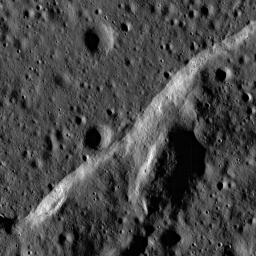
|
Wrinkle Ridge Near Montes Teneriffe
- Click the image above for a larger view
- Full-Res JPEG (1200 x 1200) (289.4 kB)
- Full-Res TIFF (1200 x 1200) (1.4 MB)
Caption:
Boulders perched atop a wrinkle ridge in Mare Imbrium west of the Montes Teneriffe. Image width is 2 km, NAC frame M102264014RE.
Mare wrinkle ridge outlined by dramatic low Sun shadowing. Common in the lunar mare, wrinkle ridges are found in nearly all of the lunar maria, lunar scientists think that there is a genetic relationship between the basalts they deform and the ridges themselves. Basalt is much denser than the anorthositic crust on which the mare basalts are deposited. As the basalt fills in low areas in the crust, the increased weight causes sagging and the mare deposit is compressed, resulting in tectonic deformation in the form of wrinkle ridges.
Background Info:
NASA's Goddard Space Flight Center built and manages the mission for the Exploration Systems Mission Directorate at NASA Headquarters in Washington. The Lunar Reconnaissance Orbiter Camera was designed to acquire data for landing site certification and to conduct polar illumination studies and global mapping. Operated by Arizona State University, the LROC facility is part of the School of Earth and Space Exploration (SESE). LROC consists of a pair of narrow-angle cameras (NAC) and a single wide-angle camera (WAC). The mission is expected to return over 70 terabytes of image data.
Cataloging Keywords:
| Name | Value | Additional Values |
|---|---|---|
| Target | Moon | |
| System | Earth | |
| Target Type | Satellite | |
| Mission | Lunar Reconnaissance Orbiter (LRO) | |
| Instrument Host | Lunar Reconnaissance Orbiter | |
| Host Type | Orbiter | |
| Instrument | Lunar Reconnaissance Orbiter Camera (NAC) | |
| Detector | Narrow Angle Camera (NAC), Wide Angle Camera (WAC) | |
| Extra Keywords | Grayscale, Mountain, Shadow | |
| Acquisition Date | ||
| Release Date | 2009-12-29 | |
| Date in Caption | ||
| Image Credit | NASA/GSFC/Arizona State University | |
| Source | photojournal.jpl.nasa.gov/catalog/PIA12938 | |
| Identifier | PIA12938 | |
